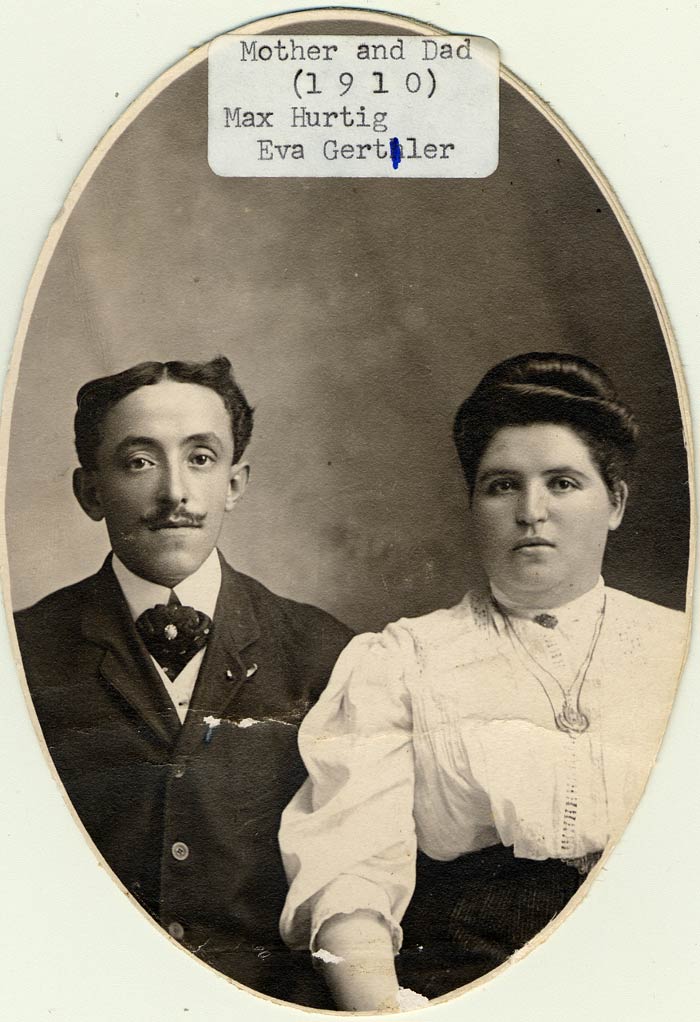By Sheila Hurtig Robertson
My grandfather, Max Hurtig, was born in Falticeni, Romania, in 1887. In 1903, worried about anti-semitism, his father, Mayer, sent him to Switzerland to learn to be a watchmaker. Max disliked the trade and so went to England. Hearing about Canada, he worked his way across the Atlantic on a cattle boat bound for Montreal where he washed dishes before deciding to carry on to Winnipeg. Robbed a few days before his departure, he had to “ride the rods” on freight trains, a journey that took three weeks.
When Max arrived in Winnipeg in 1904, he knew no one and it was very difficult to find a job without a trade. He eventually got a job in the stone quarries in Tyndall and Garson. He saved enough money to buy a wagon and a team of horses and became a contractor hauling the cut stone.
In 1913 Max started M.B. Hurtig Coal, Wood, and Building Supplies. He also ran a livery business from the family home, with the stables at the back of the property. Before long he had earned enough to bring his father, five brothers, and two sisters to Canada.
Max moved to Port Arthur in 1914 at the age of 27, after his friend, Sam Bronfman, bought the posh and prestigious Mariaggi Hotel and installed Max as manager. He came with little but an opportunity and boundless ambition to make the most of it. A builder and a dreamer, he was richly endowed with the patience and determination to turn his dreams into reality. It was in Northwestern Ontario that he discovered his element, becoming an ardent outdoorsman and student of nature as well as an astute businessman.
Max’s interests embraced much of the great Northwest he loved and included the Pigeon River Resort Hotel, International Transit Limited (the first bus line to serve the area), the Northland Hotel in Beardmore, the Mariaggi Hotel in Geraldton, the Empire Hotel in Fort William, the Port Arthur Café, and the Cloud Lake Sawmill, which supplied pine to support the war efforts of Canada-Car and the Port Arthur Shipyard. His hotels also served as bus depots for his bus line.
A committed member of Shaarey Shomayim Congregation, Max combined his talent for success with generosity. He did it quietly, without fanfare and thought of remuneration. His son Harry remembered the Great Depression “when the Mariaggi was half full of those who had fallen on hard times.” Said Mayor Saul Laskin: “Whenever a charitable campaign came up short of money, you could count on Hurtig. He was always the philanthropist. He was a generous person, a person who liked giving … He was a good fellow to know when the going got tough.”
Also quietly, he helped to bring several survivors of the Holocaust to safety in Canada, an action that kindled my interest in the tragedy and eventually led to my current involvement with CHES.
When Max died on January 31, 1965 at the age of 78, he’d won a legion of friends and earned as many testimonials. As local historian Russell Brown said: “He was a darned good citizen.” An editorial in the local paper noted: “Port Arthur has lost a fine citizen and a devoted booster with the death of Max Hurtig … He was in the truest sense a builder and his action in operating his own snow clearing equipment to ensure dependable bus service was a measure of his dedication to the advancement of Northwestern Ontario. His business initiative combined with his civic pride gave him a place of prominence in this area, which he well deserved.”
Postscript: Two of Max’s nephews, Dr. Abraham Hurtig and Dr. Henry Hurtig, were residents of Ottawa.
